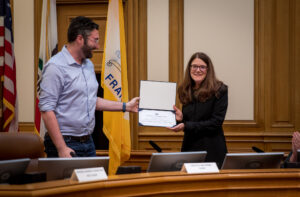As we previously reported, on March 7, 2017, CCSF Local 21 members voted overwhelmingly to ratify the Tentative Extension Agreement (TEA) in what was the highest number of votes cast on a  contract ratification in recent years. 95% of those who cast ballots voted in favor of the Extension Agreement.
contract ratification in recent years. 95% of those who cast ballots voted in favor of the Extension Agreement.
The San Francisco Board of Supervisors also voted to approve the TEA, making the Extension Agreement official. CCSF now has a contract in place until June 30, 2019.
The Extension Agreement secures 6% raises for CCSF members over 2 years, 3% each year. The 2018 raise could be pushed back 6 months in the event the City’s 2018 March Joint Report shows a projected budget deficit of more than $200 million. The Extension Agreement is the first of its kind in history, with 33 San Francisco public unions joining together to reach Extension Agreements that all have the same major terms.
For FAQs about the Extension Agreement, click here.
CCSF Members should expect 3% increases to take place on July 1, 2017. The new CCSF Contract will be posted online as soon as all the signatures are collected.
San Francisco VP Gus Vallejo says, “I congratulate my fellow members on ratifying a smart deal that will get us 6% in this climate of uncertainty about the future. We have a lot of work ahead of us to protect the public services we provide, and I am hopeful that our members will step up and get involved.”
Throughout the Extension process, members have spoken about the need to acknowledge the current political climate in the US and strategize around it. Leaders have determined that reaching an Extension Agreement with the City isn’t just smart, it frees us up to engage in a bigger fight. Agreeing to a fair contract extension instead of being locked into a contentious battle with management means more than short-term security. It also means that we can work on issues that could have disastrous long-term effects on our jobs, our public services, and our communities.
L21 has a mandate to advocate for member’s jobs. But public services and labor rights do not exist in a vacuum, unrelated to other issues. Rather, public services and worker’s rights are woven into the very fabric of our communities. Attacks on healthcare, immigrants, women, people of color, LGBTQIA folks, religious and ethnic minorities, etc. are intimately tied to the current debate over what public services should be offered and who they should be offered to.
That’s why Local 21 has launched a Local 21 Resistance Program, which will coordinate union members’ activism to protect our services and communities. Workers know best how services and communities will be impacted by policies and budget decisions. Send messages about what you think should be a focus for the Resistance Program to resist@ifpte21.org. And be on the lookout for ways to join your co-workers in resisting policies that hurt our communities and our jobs!





